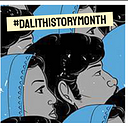Celebrating Dalit History: Happy Ambedkar Jayanthi!
AMBEDKAR JAYANTHI TO ALL ! JAI BHIM!

“#DalitHistory today is honored to write a post on our dear Babasaheb on this special day. While to the most of the world, Dr. B. R Ambedkar is known as the architect of the Indian constitution, a social reformer, and an eminent jurist; his contribution as an economist, as an advocate of women’s rights; as a writer, an educationist, and a philosopher is also equally important. In this capacity he is not only a Dalit icon but a true revolutionary and is recognized as a founding father of independent India.
Dr. Bhimrao Ramji Ambedkar was born the 14th child on April 14th, 1891 into DALIT family. Discovered by a Maharaja Sayaji Rao he received a full scholarship and went on to study at the Elphinstone College, Mumbai in 1908. From there he was one of the first Indian to study abroad and he went to pursue economics at the Columbia University. Later, he became a professor of political economy at the Sydenham College of Commerce and Economics. In 1920, he went to London to get his Bar-at-Law at Gray’s Inn for Law. On 8 June, 1927, he was awarded a Doctorate by the University of Columbia. From 1920 to 1930, he also published a series of newspapers namely Mook Nayak (The Silent Hero), Bahishkrit Bharat (Exiled India), Samata (equality), and Janata (People)
Upon his return to India he faced vicious caste discrimination with top employers refusing to hiring him. Thus began Dr. Ambedkar’s relentless struggle for equality for Dalits. He had a multi-pronged strategy: First eradicate illiteracy, then focus on the economic upliftment while also using non-violent struggle against visible symbols of casteism, like denial of Acess to water from public wells and tanks. He later added the powerful call for Dalits to leave Hinduism for Buddhism. Leading to one of the largest mass conversion in world in Nagpur where over 600,000 Dalits joined Him in becoming Buddhist.
Ambedkar’s leadership in the independence movement ensured Dalits were at the table in the crucial Round Table conferences that led to the formation of the Indian State. While disappointed at Gandhi’s obstructionism of the ask for separate Dalit electorates, it was his advocacy that led to the reservation system that helped provide affirmative action to Dalits and Adivasis in government and public institutions.
In the wake of his legacy this post is a call to read and learn more from this towering leader. He leaves behind a rich treasury of speeches and almost forty books that are more than still relevant today. In fact his seminal text, “Annihilation of Caste”, is available for free everywhere around the world. In his honor, we leave you with his exhortation to educate, agitate, and organize. And of course the Dalit salutation which is a honorary reference back to him:#JaiBhim! and HAPPY AMBEDKAR JAYANTHI TO ALL !”
